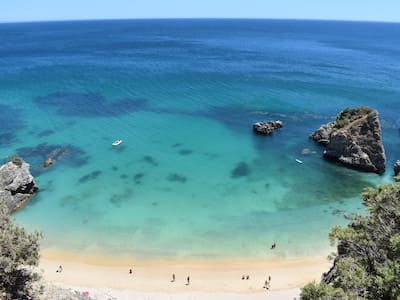
Lisbon's Metro trains are regularly disinfected
* Portugal is open to travelers from all over the world (including the United Kingdom, the United States, Canada, and the European Union).
* In 2026, Covid-19 vaccination certificates, RT-PCR or rapid antigen tests and the Passenger Locator Form are NO LONGER required to enter Portugal or to access hotels or any public places.
* Masks are NO LONGER required in public indoor spaces or public transportation. They're only required at hospitals.
Portugal is slowly returning to pre-pandemic life, as it became the world's most vaccinated nation -- practically all adults have been vaccinated.
The first case of the COVID-19 coronavirus in Portugal was detected on March 2nd, 2020, in the city of Porto. The first diagnosis in the Lisbon region was announced a day later. The Portuguese government immediately implemented measures to prevent the spread of the virus, and declared a State of Emergency on March 18. Public events were cancelled, non-essential movement was restricted, and schools, restaurants and shops, as well as access to the beaches, were closed. Only grocery stores, supermarkets, pharmacies, and bakeries were allowed to remain open, but with a limited number of people inside at a time. Thanks to these early, strict measures, the spread of the virus was slowed, and Portugal was cited as a positive example in Europe.
Number of COVID-19 Coronavirus Cases in Lisbon and Portugal
Throughout the Covid-19 pandemic, Portugal has been able to maintain one of the lowest pandemic mortality rates in Europe, despite having the continent’s third-highest population of 80+-year-olds. Self-discipline of the Portuguese population has been credited for that, after news of the high numbers of cases and deaths in the neighboring countries.
However, the new Delta strain had an impact in Portugal in January 2021, leading to increased hospitalizations and death rates. The number of infections also increased with the Omicron variant later in the year, but hospitalizations and deaths have been low.
Evolution of the Virus in Portugal and Restrictions
Portugal closed its borders early in March 2020, and, on the 18th of the month, all European Union countries closed their borders to non-EU nationals. Commercial flights to most countries were suspended. The mandatory lockdown was lifted on May 4th, and small businesses reopened. Restaurants and museums reopened on May 18, and shopping malls, gyms, and theaters on June 1st. Beaches also reopened but with a mandatory distance between sunbathers. When arriving at Lisbon’s and other Portuguese airports, each passenger’s temperature was checked, and if it was 38 degrees or over, they were referred to the local health authorities.
Due to the second wave of the virus in Europe in October, the Portuguese government ordered a partial lockdown in 121 municipalities, including Lisbon, starting on November 4th, advising people to stay home except to go to work, school or shopping (shops and restaurants remained open, but had to close by 10pm and 10:30pm respectively). In January 2021, due to the higher number of infections and deaths, a new national lockdown was declared, starting on the 15th, for an undetermined length of time, but a reopening was eventually scheduled for April 5th. These measures were meant to guarantee that the national health service continued to have capacity to respond to every case.
Is it Safe to Travel to Lisbon, Portugal?
As COVID-19 is still spreading and massive vaccination hasn't happened in all countries, the travel risk remains moderate. If you’re traveling, regularly wash your hands with soap and water, or with an alcohol-based sanitizer. Avoid touching your eyes, mouth, and nose, and always cover your mouth and nose with your elbow (not with your hands), every time you cough or sneeze. Keep a safe distance (2 meters, or 6 feet) from other people. If you develop respiratory symptoms (cough or shortness of breath) and/or a fever, postpone your trip, stay at home, and immediately seek medical help.
If you’re able to travel to Lisbon, it’s required that you maintain the social distance, even at the beaches, where parasols and towels must be kept 2 meters (6 feet) apart. Buses and metro trains are regularly disinfected, but you must remain distant from other passengers, when possible.


